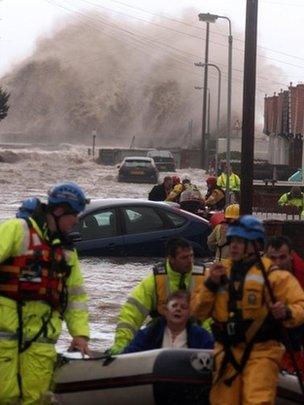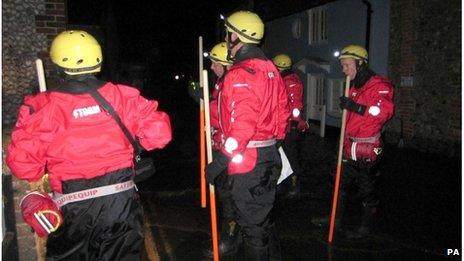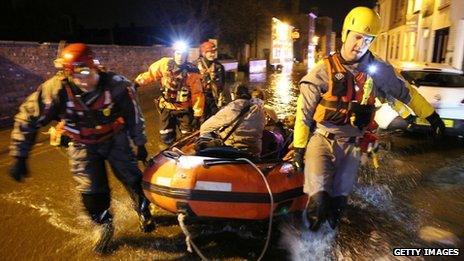Lethal storm and tidal surge sees thousands out of homes
- Published
The BBC's Nick Beake spoke to people in Clacton-on-Sea in Essex, who evacuated their homes overnight
Thousands of people have had to evacuate their homes as a severe storm batters large parts of the UK.
The Environment Agency has more than 60 severe flood warnings in place, external.
England's east coast is experiencing the worst tidal surge in 60 years, while in north Wales residents had to be rescued by lifeboat crews.
Earlier, a lorry driver died after his vehicle was blown on to two cars in West Lothian, while a man was killed by a falling tree in Nottinghamshire.
In addition to severe flood warnings - meaning there could be a danger to life - the agency has 120 flood warnings in England and Wales.
An agency spokesman said that in the "worst-case scenario" 6,000 properties could be flooded.
The Scottish Environment Protection Agency has issued more than a dozen flood warnings, external.

The storm hit north Wales where there was flooding in coastal areas
The Environment Agency confirmed to the BBC the North Sea tidal surge is the worst since January 1953, although flood defences built since then mean many parts of the country are now better protected.
Environment Secretary Owen Paterson - who chaired two of the government's emergency Cobra meetings on Thursday - said the armed forces were on standby to help if necessary.
Essex Fire and Rescue Service said 10 rescue boats had been sent to Jaywick, near Clacton-on-Sea in Essex, where the sea wall was breached in Hillman Avenue just before midnight. Firefighters were evacuating 2,500 homes.
In Lincolnshire, emergency planners said up to 18,000 homes in the Boston area could be affected by flooding.
Water breached the town's sea defences, leading to the closure of several streets and the evacuation of vulnerable people.
In Great Yarmouth, on the Norfolk coast, police are visiting 9,000 properties to advise people to leave their homes ahead of a storm surge expected at high tide, at 22:45 GMT.
Respite centres have been opened in high schools, and ill and elderly people have been asked to call the council for help. In addition, 20,000 sandbags have been distributed.

Firefighters carried out house-to-house checks in Blakeney, Norfolk, overnight

People were rescued in the High Street in Boston, Lincs, on Thursday evening
More than 1,000 sand bags have been handed out in Aldeburgh, Suffolk in preparation for the tidal surge. A minibus is collecting people in vulnerable areas and taking them to a rest centre.
Elsewhere, about 400 people were told to leave their homes in Rhyl, Denbighshire, while police say 300 people have been urged to find safety in Port Clarence, Middlesbrough.
The storm hit north Wales, where there was flooding in coastal areas.
Homes and businesses are at risk in Suffolk and Norfolk, and in Lincolnshire thousands of people from coastal areas are being evacuated to Scunthorpe.
Residents in Kent are also being warned of the danger of flooding. In Seasalter 70 properties have been evacuated as well as 200 in Faversham ahead of expected flooding in the early hours of Friday.
Prime Minister David Cameron tweeted, external that he was ensuring all government departments and agencies were doing "all they can to help with [the] storm".
Mr Paterson also urged people "to pay close attention to announcements by the Environment Agency".
The British Red Cross urged people in high-risk areas to be prepared.
Head of emergency planning and response Simon Lewis said: "Flooding can happen very quickly, leaving little time to prepare, so don't wait for the worst to happen - if you're in an area at risk, get ready."
Other developments include:
64,000 homes in Scotland, 1,400 in Northern Ireland and 6,000 in Cumbria were without power due to disruption caused by the storm
One of the suppliers in Scotland, Scottish Power, said it had reconnected 46,500 homes but 3,500 were still without power
A school in Hartlepool was closed when storm-force winds ripped away part of its roof, as was one in Doncaster
The River Tyne burst its banks in Newcastle, forcing Newcastle Crown Court to be cleared
There are several warnings of affected travel, including:
Rail delays expected in Scotland, northern and eastern England, although services between Edinburgh and Glasgow and Edinburgh and North Berwick have resumed
There is disruption to a number of services, including those run by Virgin Trains, , external, Northern Rail, external, Greater Anglia, external and Southeastern, external
East Coast Trains says it will run a revised timetable, external
East Midlands Trains says most of its routes are disrupted, external and is advising customers not to travel unless necessary
The Humber Bridge is closed in both directions due to strong winds
The storm has also brought disruption to parts of northern Europe, leaving at least four people dead or missing.
Dutch airline KLM cancelled 84 continental flights from Amsterdam's Schiphol airport, while around 20 were cancelled at Hamburg airport.
One of Europe's longest bridges - connecting Sweden to Denmark - is closed.
BBC weather presenter Matt Taylor explained that "storm surges" begin when a rising area of low pressure takes pressure off the surface of the sea, allowing it to "bulge" upwards.
"Then, as that pulls away, you get the very strong winds on the back edge of the low pressure and then that shoves that bulge of high sea levels down through the North Sea," he said.
Weather presenter Matt Taylor explains how a storm surge happens
The Met Office said there had been severe gales of between 60mph and 80mph across Scotland and northern parts of England, with some mountainous regions in Aberdeenshire and Inverness-shire recording speeds of around 140mph.
Conditions across the UK are expected to have improved by the weekend.
- Published5 December 2013
- Published5 December 2013
- Published5 December 2013
- Published5 December 2013
- Published5 December 2013
- Published6 December 2013
- Published6 December 2013
- Published5 December 2013
- Published5 December 2013
- Published6 December 2013